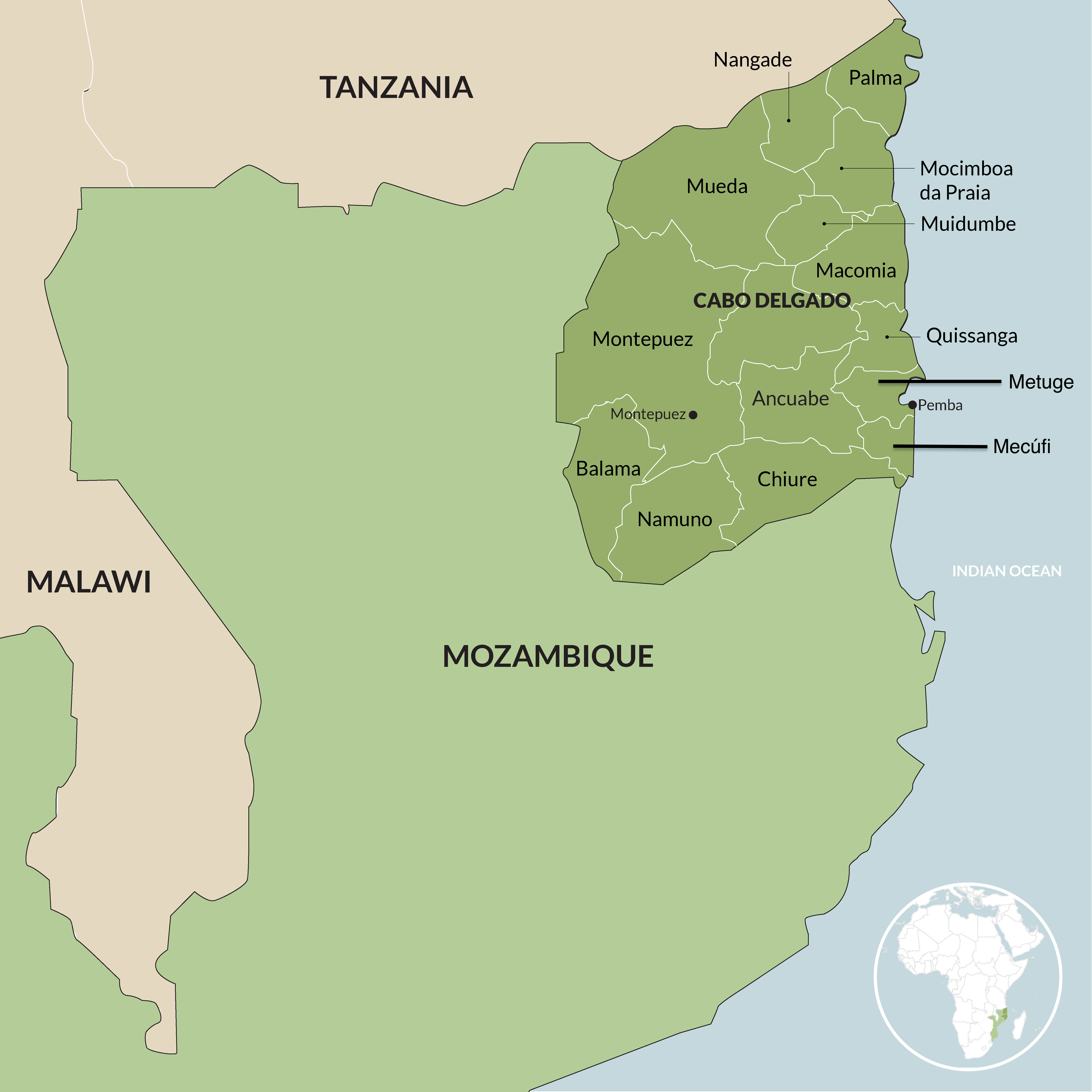Cabo Delgado insurgency persists amid failed military strategy
Eight years on, northern Mozambique’s terrorist threat remains acute despite the deployment of thousands of local and foreign troops.
Cabo Delgado’s armed insurgency marked its eighth anniversary this October. With attacks occurring on a near-daily basis, terrorism continues to pose a serious threat to local communities.
Over the past eight years, the Mozambican government has responded almost exclusively with a military approach, deploying state forces, private military companies and foreign troops to Cabo Delgado. Yet none has succeeded in neutralising the threat.
The insurgency, which began in October 2017 in the Mocímboa da Praia district, has since expanded to 16 of Cabo Delgado’s 17 districts. The provincial capital, Pemba, remains the only area not to have suffered an attack by the Islamic State-linked insurgents.
Some districts in the neighbouring provinces of Nampula and Niassa have also been attacked. To date, the conflict has caused more than 6 200 deaths and displaced over 1.1 million people, around half the province’s population.
|
Districts of Cabo Delgado, Mozambique

|
Initially, Mozambique downplayed the insurgency, classifying the attacks as banditry. However in 2020, Maputo officially declared that the country was under external aggression from an international terrorist group. The acknowledgement came after insurgents began attacking and occupying district capitals, dislodging local administrations, looting property and even raising the Islamic State flag.
Faced with the escalating threat, the largest natural gas project in northern Mozambique, led by TotalEnergies – with an approved investment of over US$20 billion – was suspended in 2021 under a force majeure declaration. The project remains formally closed.
Under pressure from investors whose projects were put on hold, the government invited foreign forces to help fight the insurgency. That same year, approximately 3 000 troops from Rwanda and the Southern African Development Community Mission in Mozambique (SAMIM) were deployed to Cabo Delgado to support Mozambican forces.
Three years later, SAMIM withdrew, claiming to have achieved its objective. Rwandan forces remain on the ground, with estimates of more than 5 000 personnel currently deployed, including soldiers and police.
The largely local causes of the insurgency require a holistic approach that goes beyond military action
Tanzania initially contributed troops through SAMIM. After the mission’s withdrawal, the country retained a contingent of around 300 soldiers in Nangade district on the border between the two countries.
Other international partners, including European Union (EU) member states and the United States, have sent trainers to build Mozambican forces’ counter-terrorism capacity. The EU also provides logistical support to Mozambique and Rwanda. Private military companies, including Russia’s Wagner Group and South Africa’s Dyck Advisory Group also intervened, both in active combat and in training government troops.
Despite these extensive efforts, the terrorist threat in Cabo Delgado remains active. In September alone, around 30 attacks were recorded across the province’s villages. These resulted in at least 40 deaths, 39 of them civilians, and forced about 20 000 people to flee their communities.
The primary cause of failure in combatting the insurgency is the absence of a holistic strategy that addresses the root causes of the conflict. While supported by Islamic State, the Cabo Delgado insurgency is driven largely by local factors, including social, political and economic exclusion by the central government in Maputo.
Corruption and abuses by government forces deployed to fight terrorism have fuelled the conflict
Identity issues such as ethnic tensions between the main local groups – the Makonde, Mwani and Macua – are also cited, particularly regarding unequal access to state resources. These ethnic disputes overlap with religious divides, as some groups are predominantly Muslim, while others are mainly Christian.
The discovery of major offshore natural gas reserves in Cabo Delgado is seen as one of the conflict triggers, owing to unequal access to the benefits of gas investments. Communities living in the discovery zones, where the insurgency first emerged, have been largely excluded from job opportunities, mainly because of a lack of technical skills required by the industry.
Corruption and abuses against civilians by government forces deployed to fight terrorism have further fuelled the conflict. Insurgents have exploited these grievances to recruit locals, particularly young people, and to present themselves as defenders of Muslim communities oppressed by the central government, whose leadership has been historically Christian.
The causes of Cabo Delgado’s insurgency are complex and largely local, requiring a holistic approach that goes beyond military action. In March, the government approved a national strategy to prevent and contain violent extremism, but its design was not inclusive. Regional and local organisations, including civil society and religious groups, were neither widely consulted nor assigned significant roles in its implementation.
Poorly managed insurgencies can become protracted and regionalised, as in the Sahel and Lake Chad Basin
Maputo has also ignored political dialogue initiatives, despite dialogue having proven valuable in understanding conflict drivers, exploring non-military solutions and facilitating talks between the conflicting parties.
By framing the insurgency solely as international terrorism, Mozambique further restricts opportunities for negotiation. Local leaders who attempt to contact insurgents to establish platforms for discussion are often treated as terrorist collaborators, undermining such initiatives.
If the country maintains its exclusively military approach, the insurgency could last for decades, like al-Shabaab and Boko Haram have in East and West Africa. This would further erode human security in Cabo Delgado, with the potential to spread to other provinces and neighbouring countries.
Experience from other parts of Africa facing similar insurgencies shows that poorly managed conflicts of this nature can become protracted and regionalised, as in the Sahel and Lake Chad Basin.
Regional organisations such as SADC and the African Union, along with international partners, should persuade the Mozambican government to adopt a holistic approach in Cabo Delgado that goes beyond military action.
Exclusive rights to re-publish ISS Today articles have been given to Daily Maverick in South Africa and Premium Times in Nigeria. For media based outside South Africa and Nigeria that want to re-publish articles, or for queries about our re-publishing policy, email us.

